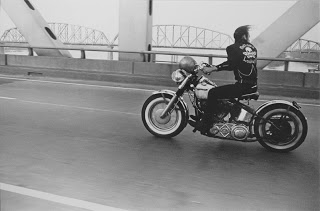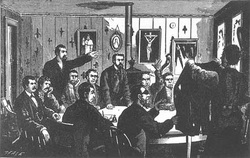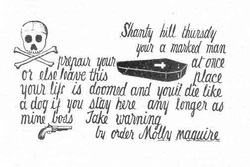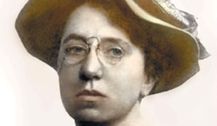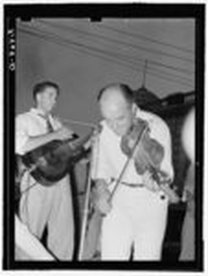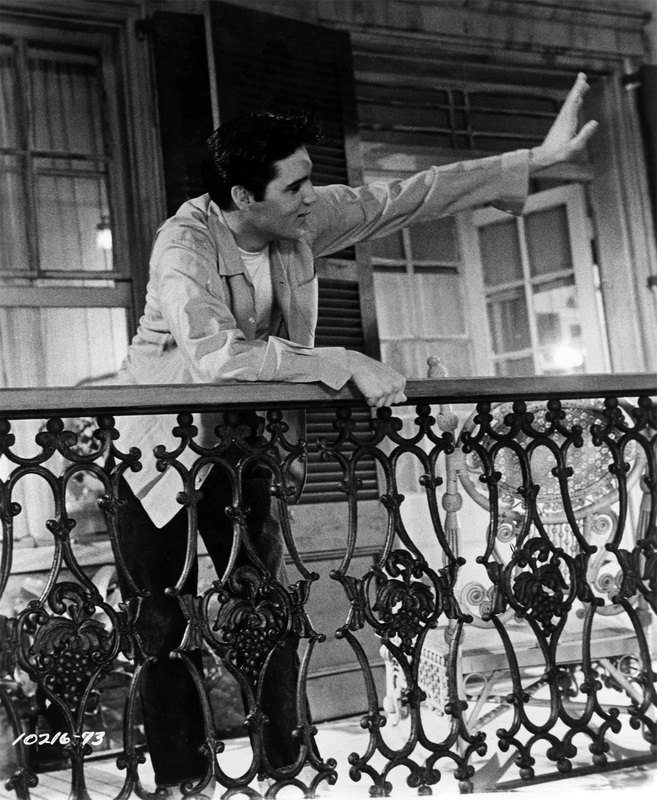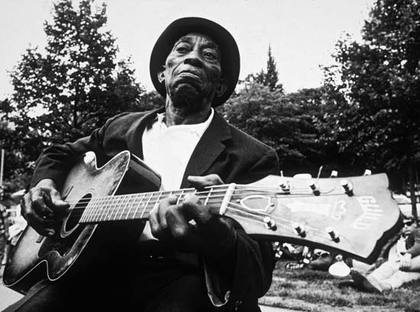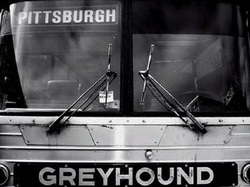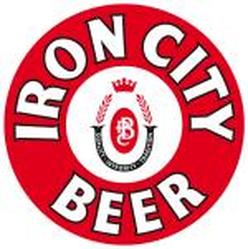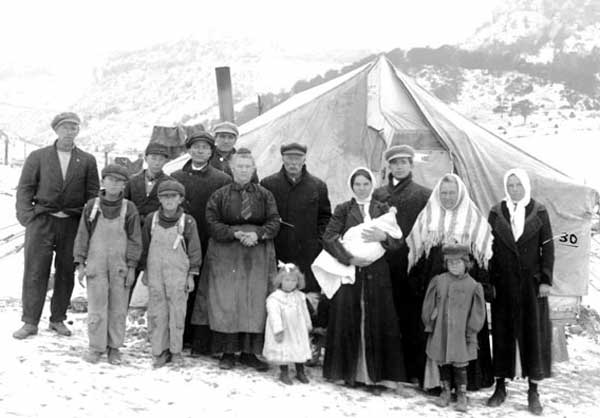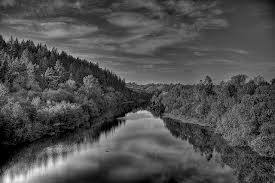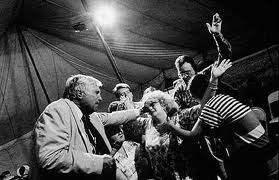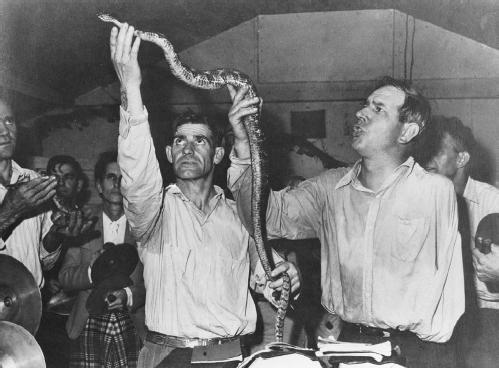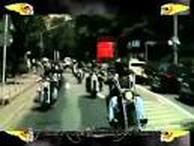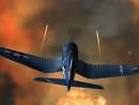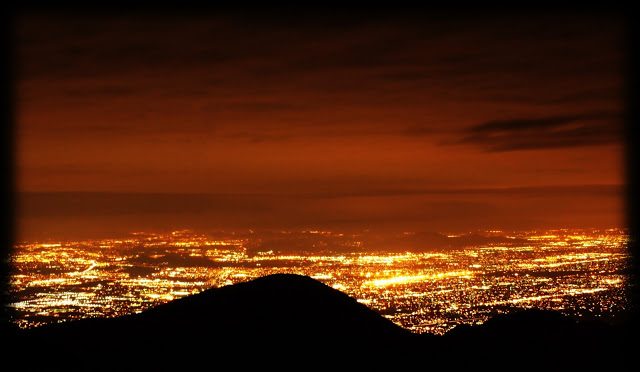Americanarama
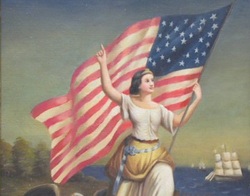
What is it if it's not rock, country, folk, blues, bluegrass, zydeco, Tex Mex, jazz, or anything else you can put your finger on, but its roots twist deeply into the dirt, pavement, tundra, clay, sand, mud, tarmac, gravel, pumice, asphalt, and hardscrabble of America?
We don't know, either. What we do know is that Neon Leon was a musical shape-shifter, a cultural changeling. He played plenty of everything and a little of some styles no one's ever hung a tag on.
Americanarama is a plunge into the American dream. Or nightmare. This set includes a lot of death and despair — retail and wholesale, earned and stolen, sudden and protracted, deserved and deplored — with an occasional dash of bittersweet nostalgia to brighten things up. Okay. Next stop, Extreme Unction Junction.
Songs on this page:
We don't know, either. What we do know is that Neon Leon was a musical shape-shifter, a cultural changeling. He played plenty of everything and a little of some styles no one's ever hung a tag on.
Americanarama is a plunge into the American dream. Or nightmare. This set includes a lot of death and despair — retail and wholesale, earned and stolen, sudden and protracted, deserved and deplored — with an occasional dash of bittersweet nostalgia to brighten things up. Okay. Next stop, Extreme Unction Junction.
Songs on this page:
- Kentucky Outlaw Nomad Biker Dude
- The Molly Maguires
- The Shreveport Shuffle
- Tarantula
- Stagger Lee
- Repo Gal
- The Youngstown Bus
- Ludlow
- Russian River
- Angelee
- (Down the Freeway To) San Berdoo
_______________________________________
|
1. Kentucky Nomad Outlaw Biker Dude
copyright Leon Fullerton Kentucky-bound boy
astride a great chrome dream, saw your picture in a Santa Cruz Internet laundromat cafe, flying over the Ohio, it was '66, but it looked like yesterday. A mournful woman sang a mournful song on a mournful guitar on a mournful stereo, just like she knew you, lonesome rider such a long, long, long, long, long, long time ago. Every life is a bridge, every river flows home, every song is another lost love, every destination remains unknown. Kentucky-bound boy with a skull and bones wind-combed, grease-swept, sun-stroked mad-dog hair, looking backward, beyond the picture, like the camera wasn't even there. There's songs of freedom, songs of the open road, songs of defeat, songs of the open grave. Was there freedom in a bluegrass tune, was there freedom in the song she gave? Every life is a bridge, every home is a stone, every song is another lost love, every destination remains your own. |
This 1966 photo by Danny Lyons was one of Fullerton's favorites. (A signed print of it is one of several dozen works of art currently at issue in Fullerton's estate dispute.) Lyons and Fullerton met in a variety of settings over the years - at civil rights demonstrations, at biker runs, in towns clustered along the U.S.-Mexico border - and admired one another's work.
The song was inspired by a poster of the picture Fullerton encountered at an internet laundromat cafe (the existence of which Fullerton called Exhibit A in his ongoing case against neo-hip-dom, consumer cool, web narcosis, and normative middle-class misbehavior in general) in Santa Cruz, California. He'd gone to the seaside town in 2000 to seal a product endorsement deal with Santa Cruz Guitar Company, which had expressed interest in producing a Neon Leon signature model axe. The hell was in the details, beginning with Fullerton's famously infamous punctuality disorder and ending with an exchange of the kind of words that are quickly forgotten in the wake of the sort of frenzy of embellishment native to raconteurs eager to discount their own absence when the actual words were uttered. Suffice it to say: Fullerton beat a retreat, seeking quick solace in the first sturdy cup of joe he could find, and found himself in a coffee house puzzling over an absurdly wide selection of coffees from lands familiar only to the League of Little Nations and Indiana Jones. The coffee was adequate, the ambiance ambient. A Gillian Welsh album played sadly but agreeably on the stereo, laundry sloshed in the washers and thudded in the dryers, lattes shwooshed and snorkled into patrons' mugs, keyboards clacked, a cash register clattered and beeped, and the poster of the Lyons photo, hanging in the stairwell to the upper salon, presided - a surprise visitation, right when Fullerton needed at least the ghost of a friend. He bummed a ballpoint from a barista, snatched some napkins, sat down with a cup of the house's latest designer blend (Frank Sumatra), pulled his old Gibson LG-2 out of its case (a small guitar good for traveling, the prototype for the proposed Santa Cruz model), composed "Kentucky Outlaw," played it for the Urban-Outfitted patrons, got the response "you only get when you've buttoned up one hell of a tune,"* and pronounced the trip to Santa Cruz a success. |
_______________________________________
|
2. The Molly Maguires
copyright Leon Fullerton Some call them criminals, some call them fine folks,
some call them history, some call them a hoax. Let’s now curse the company’s stools, thugs, and liars, and raise a kind glass to the Molly Maguires. The coal company paid the judge good and well to send those young miners straight down to hell. They were fine Irish lads, to the end, firm deniers they were cloaked in the name of the Molly Maguires. A Pinkerton man would lie, cheat, and kill to reap the sweet fruit of the company’s till. They auctioned their souls to the wealthiest buyers and bartered the blood of the Molly McGuires. A coal miner digs and then digs some more his deepening debt to the company store. Climbing out’s his most fervent of burning desires. Did it turn desperate men into Molly Maguires? A miner can die by blast or by rock, by gas or by dust or a crooked court’s dock. They framed honest men in plain sight of God’s spires and laid the blame square on the Molly Maguires. Detective McParland named ten for the noose. Those men were no angels was the judge’s excuse. They torment poor Kelly. At last he conspires. A drunk and a Judas betrayed the Molly Maguires. Were the accused men hell's demons or underground saints? The owners cried murder to dismiss their complaints. Are they ‘neath heaven’s vaults or in hell’s raging fires? Which do you suppose hosts the Molly Maguires? By thousands they came from far and from near to witness the hanging of the men they held dear. May their memories not fade, but blaze like great pyres and cast a bright light on the Molly Maguires. Now many long years have come and they’ve gone, but the coal miner’s work will never be done. In the black coal that fuels a proud nation’s desires still burns the red blood of the Molly Maguires. |
When Leon, Lionel, and Cat would visit their grandmother at her home in West Virginia. Leon would sleep under a framed copy of the Irish Proclamation of Independence.
Their grandmother told them the story of the Molly Maguires often. She said she knew one of them. This song tells their story as Fullerton remembers it. He had a soft spot for Kelly the Bum, the figure he considered the most tragic. Fullerton didn't admire anyone who would sell out his countrymen but knew, even at an early age, that it's foolish to judge someone until you've been faced with the same choices. |
_______________________________________
|
3. The Shreveport Shuffle
copyright Leon Fullerton Honey, press your dancing dress,
shine up your shimmy shoes, the revolution must be 'round the bend, 'cause the whole world's got the blues. We always fought the Good Fight and danced Red Emma's tune, we used to sing "Down By the Riverside" and "The Rising of the Moon." I can still taste Mateus and Bali Hai like it was yesterday, when cold Cold Duck was champagne and every day was the first of May, and every Orange Sunshine was a paisley paradise, and life kept interrupting, and we never did think twice. Now Clancy's Queen of the Mardi Gras, and Ned's stepped to the bar, and Hank is in a Cajun band playing bass guitar, and Mojo marks his calendar, waiting for the day he has the heart to stagger back to where he lost his way. We knew all the songs of freedom - I still love that flat-top sound! But you can't build a strong foundation without giving up some ground. So a hard-tail Strat through a hot-rod amp will rock the house tonight, and I'll vamp on the Shreveport Shuffle until I get it right. My first day with Dora busted all the clocks, and my first night with Nora vaporized my socks. We never did sing "Auld Lang Syne" to mark the passing time, but the years, they rolled by, anyway, and left a few behind. So Clancy's Queen of the Mardi Gras.... |
Fullerton's boyhood households included musicians, artists, trade unionists, communists, fellow travelers, and a variety of characters he called blimps: people floating through with no visible means of support.
There was always music in the house - often the radio, often people with guitars, banjos, fiddles, and harmonicas swapping songs. His mother played a German spinet they'd hauled from Oklahoma in their truck. The music he heard ranged from Tin Pan Alley to blues to gospel, and there was a good share of liberation music, as well - African American spirituals, Irish revolutionary screeds, union songs, and more. Not long after the family moved to the Bay Area in the sixties, songs of justice began giving way to more hedonistic (and seductive) themes. Rock was on every psychedelicized mind. We don't know who Clancy, Ned, Hank, Mojo, Nora, or Dora were, but we do know that Fullerton spent a good deal of time expanding his consciousness and shrinking his bank account at events presented by the Bay Area's Family Dog collective. His daughter speculates that he might have been remembering some of them in 1990, when he was doing carpentry, tending bar, and sitting in with a number of local acts around southern Louisiana. |
_______________________________________
|
4. Tarantula
copyright Leon Fullerton (instrumental) |
There are two stories about the genesis of "Tarantula." We won't vouch for the authenticity of either.
Version 1: The tune was a favorite of Whole Earth Catalog creator Steward Brand, an early chronicler of Fullerton as the original space cowboy. In The Last, Final, I Mean It This Time, Dammit, Really, No Shit, Absolutely End-of-the-Line Supplement to the Whole Earth Catalog, Brand recounts a conversation he says he had with Bill Graham, the late concert producer. Brand wrote that, according to Graham, Fullerton opened for the Parliament Funkadelics in 1970 at the Fillmore East in Greenwich Village. This was a typical Graham intentional artist mismatch meant to open the ears and minds of the Fillmore's young and impressionable audience. Fullerton stuck around to hear the Funkadelics show. (He even rode the Mothership after the show.) The tune that impressed him most was "Maggot Brain," a short, repeating chord progression overlaid by a manic lead guitar. Brand said Graham said Bootsy Collins said Fullerton said: "Far out! I gotta do something like that!" Version 2: An alternate reality was related by nephew Delmont Fullerton. According to Del, Leon was asked to play "The Tarantella" at his nephew Raphael's bar mitzvah in New Jersey. This was the best he could come up with. In keeping with the occasion, he made it a medley, ending with an equally unrecognizable "Hava Tequila." Which seemed like a good idea at the time. |
_______________________________________
|
5. Stagger Lee
copyright Leon Fullerton Billy Lyons said to Stagger Lee,
"So glad you packed your gun. On the highway to Emmaus, ran into Elvis on the run. ‘Wild Bill,’ he said, 'the life I've led could become an eternity, but I'd sooner lie down here and now than cross old Stagger Lee.' "I could not doubt He was the King, for when they rolled away the stone, all they found was a sequin leisure suit and a rhinestone black-cat bone. But still, I begged to differ, for I'm reckless, rash, and true. I said, 'One clear shot at Stagger Lee is the least that I can do.'" Stagger Lee said to Billy, as he loaded up his gun, "You shoulda listened to the King, he loves you like a son. This gin joint runs an honest game, now I’m getting called a cheat, I’ll take that brand-new Stetson hat, so pleased that we could meet!" Showdown at the hoedown, just down the road from Calvary! The boy is gonna go down, throwing down with Stagger Lee! The whole town's got the low-down, everybody running out to see! Showdown at the hoe-down, heaven help a fool like me! Stagger Lee had a bead on Billy before Billy's gun cleared his pants, and Stagger Lee, he called the tune, and Billy commenced to dance. The first shot broke some bottles, the second broke some hearts, the rest of them broke poor Billy into a hundred parts. Elvis slipped out into the alley - no one ever saw - sashayed down Billy's house, tapped on the kitchen door. The house was dark, a woman called, "Billy where you been?" Elvis said "Billy's gone for good," Billy's widow said, "Come on in!" Showdown at the hoedown... |
It comforted Fullerton to know that he wasn't the only one to have seen Elvis Presley alive long after the King's go-by date went by.
But he may have held the record for quantity of sightings. The fact that he'd seen Elvis more than once, and always in unlikely places - cross-legged in a loin cloth atop a peak in the Sangre de Cristos, on all fours in a prison jump suit lapping water from a freshet at the foot of Mount Shasta, in an Uncle Sam outfit pumping gas in Midland, Texas, with "Elvis" embroidered in red cursive on a white oval on the breast pocket of his pump-jockey shirt, in a pewter-gray pin-striped business suit among the commuters at the Massapequa Park station of the Long Island Railroad - smoke-signaled to Fullerton a deep communion with the king of rock 'n' roll. And Fullerton the visionary knew visions. He seldom knew what they meant, but he knew they were meant for him. And meaning was of secondary interest to the musician. Experience, he believed carried its own uber-Cartesian freight: I think, therefore I am, I think. It was upon his fifth encounter with the dead Presley that Fullerton was inspired to commemorate the legendary Memphisticate in song. It was Christmas Eve, 1995, in North Saint Louis, and a sound from down the street caught Fullerton's attention: Elvis was behind the bakelite wheel of an ancient tour bus, announcing sites of interest over the geriatric vehicle's PA system. The sound quality was poor, but the voice was unmistakable. It was a special night - not just the eve of the celebration of the birth of the Prince of Peace, but the centennial of the murder of William Lyons by the pimp "Stagger" Lee Shelton. "And it was right here, the site of Bill Curtis's old saloon, a hundred years ago tonight," Presley was telling his handful of sightseers as the geriatric bus wobbled past Fullerton, "that one 'Stag' Lee Shelton murdered his way into infamy." Fullerton had come to downtown in search of a pawnshop where he could find a worthy last-minute gift or two for himself, having no one else to celebrate the holiday with that year, and Christmas Eve struck him as a peculiar time for a tour bus to be operating. He was, in fact, thoroughly lost and nowhere near a pawn shop. Compounding the moment's peculiarity, Fullerton realized that he no longer standing in modern Saint Lou (Convention Plaza to natives, upscale urban armpit to him) but transported, Scrooge-style, into the bygone Chestnut Valley red light district that had once occupied the spot. A street sign said it the corner of Morgan and Eleventh streets. Presley continued: "Shelton shot Billy Lyons dead over a hat, seizing immortality for the both of them with just one bitty bullet. Man, it took me 107 singles, 74 albums, thirty EPs, 33 movies, one meeting with Slick Dick Nixon, and simultaneous ingestion of eight controlled substances. "But I ain't complaining. Shoot, I musta died for someone's sins. And living forever ain't a bad way to die. Now, right over there on your right...." The bus rolled on into the gathering twilight, and Presley's voice faded away. And as Chestnut Valley disolved and the twentieth century returned, Fullerton was certain that he detected the swinging of a saloon door, the bark of a pistol, the rolling of a stone, and a razor whiff of sulfur and cordite on the winter air. Just as every visual artist must sooner or later paint a crucifixion, every folk singer must sing a song about Billy Lyons, Stagger Lee Shelton, a Stetson hat, and murder most graphic. Visions of pawn shops no longer dancing in his head, Fullerton knew the time had come to swallow his Skoal and make his contribution to the tradition, alone on a holy night in a sinful city, with nary a wise man in sight. Keenly aware that immortality is for the Elvises and Jesuses of the world, not for luckless transients burdened by the curse of verse, he ducked into the first door he could find that seemed conducive to song composition - not a manger or mansion, but a hotel lobby - helped himself to a pad of the establishment's stationery, and composed the ballad that he named, in respect to time-honored tradition, "Stagger Lee." |
_______________________________________
_______________________________________
|
7. The Youngstown Bus
copyright Leon Fullerton I can see the lights of the Youngstown bus
as it splashes across the tracks, watching for your face, although I know you won't be back. I should have stood here on that day you climbed aboard to ride, oh, the water is deep, the water is wide. Oh, the water is deep, the water is wide, I heard it in a gospel song but still could not decide. I would have tried to walk on water from the Allegheny shore, if only I'd known just how much I'd need you back once more. Well, it rained and rained and rained and rained till the steel mills all fell down, but a six of Iron City will drown that mournful sound. The station empties quickly, the people hurry home, taillights melt into the mist and leave me here alone. Oh, the water is deep.... |
Fullerton's first marriage died in Pennsylvania,which he thereafter referred to as the Tombstone State. In his as-yet-unfinished memoir, he wrote: "Whenever tickets to Purgatory are sold out, the ushers direct the overflow to Pittsburgh, where it's always standing-room-only in a bitter January rain."
|
_______________________________________
|
8. Ludlow
copyright Leon Fullerton I was a Colorado guardsman
sent to the Ludlow mines. Coal miners there were out on strike, twelve hundred in their lines, along with wives and children evicted from their shacks and forced to live in canvass tents, our rifles at their backs. Greek Easter, 1914, we employed our ready guns, an armored car, and some kerosene to disperse those union sons. Routed by superior force, they counted, so they said, eleven miners' children and four wives among their dead. Our commander said we'd served right well, but work was far from done: Those strikers soon were shooting back, and taught us how to run. From Walsenberg to Trinidad, those Colorado hills shook for ten long days and nights, while those miners paid some bills. A wretched nest of reds they were, scurvy foreign scum, but in the silence of the night, one question's sure to come: I swear I love this country, God shed his grace on thee -- but are eleven children's mortal souls the price of liberty? I was a Colorado guardsman sent to the Ludlow mines. |
Armed resistance is usually a doomed enterprise in the United States, where various civil and anything-but-civil authorities have been perfecting the art of social control for centuries. Ask John Brown, Huey Newton, Geronimo, or Robert E. Lee. One possible exception: the coal wars, fought in many states over many decades to win union recognition, better pay, and safer working conditions for miners.
The story of the Ludlow Massacre was familiar to Fullerton, who grew up among trade unionists, anarchists, and worse. Hitchhiking through Colorado in the winter of '68, he warmed up at a cafe in Walsenberg, where several locals told him what they knew. He wrote "Ludlow" a few weeks later. As usual, he was more interested in the human side than the ideological. |
_______________________________________
|
9. Russian River
copyright Leon Fullerton Meet me up by the Russian River,
old friends go so far away. On the Russian's banks in old Eureka, do some catching up today. Fireflies and a far-off biker, 101's never been the same. Folks come and go, but the river keeps running. You said, "Sounds funny, but I like the name." Sunset on that cold, swift river, that was when you liked it best. Meet me there and we'll go dancing beneath the stars of the golden west. I'll meet you down by the Russian River, old times seem so far away, Where the river swells in high flood season, do some catching up again some day. do some catching up some day, do some catching up again some day. |
Richard and Cookie Stwally were biker friends of Fullerton. Richard, a small, wiry Hells Angel, made ends meet through several independent enterprises, the most interesting of which, to Fullerton's mind, was playing eight games of chess at a time for money in various cities around the country, particularly at Hard Castle's Cafe in Berkeley and Washington Square Park in New York.
The couple had met on a Hell's Angel bike run and initially connected over the discovery that they both had 27 tattoos. Richard's were mainly of the mom-and-military variety. Cookie apparently favored an S-theme: Snoopy, snakes, Satan, and swastikas. This never offended Fullerton's Jewish half. He understood that to bikers, any anti-establishment symbol was nothing more than a declaration of independence. Then as today, bikers were, as a group, less inclined toward historical analysis than toward polymorphic orneriness. It was a bigger issue to Fullerton's girlfriend of the time, a macrame artist from Olympia named Jade, who wasn't Jewish herself, but who, as a sensitive Methodist, believed she had suffered enough Episcopalian slings and arrows to empathize deeply with the Chosen. Cookie was unreceptive to Jade's suggestions that swastikas could easily be turned into, say, little windows or pinwheels or robots or...something. To each such suggestion, Cookie would name the boyfriend that gave her whichever tattoo was in question, state her age at the time of administration (fourteen, thirteen, eleven) and the (inevitably sordid) circumstances under which the artwork was executed. Destroying it would amount to a betrayal, she would conclude, and none of Jade's counter-arguments that Cookie had pretty much betrayed all of them, anyway, by the time she'd hooked up with Richard made no more sense to her than Fullerton's frequent suggestions that they all drive into town and go dancing. "Shoot, we can dance right here, Neon," she said one gloriously balmy July evening. "Ain't got no carpet, there's beer in the Frigidaire and tequila in the medicine cabinet, the music is better, and no one charges you to come in here and stomp around. In case you never noticed." Richard and Cookie's house sat on a scrubby property on the west bank of the Russian River on the outskirts of Eureka, California. A high-water marker half-way up a neighbor's oak tree indicated that the house had, only a few years before, been entirely submerged. The road was the old Route 101, formerly a major commercial artery. In distant ear-shot, a newer version of 101 - one not prone to the inconvenience of rising river water - now served the state and its motorists, and the Stwally's road was dotted with the vacant hulls of businesses that had once thrived on the the through-traffic: gas stations, ice cream stands, car washes, motels. Not far in miles from the madding crowd, it was nonetheless good country to get forgotten in - an appeal not lost on either the Stwallys or Fullerton. Fullerton and Jade moved in late in the spring, when Shasta's winter water was threatening to give the little house another good scowering. Jade came and went and ultimately just went. Fullerton stayed there through the summer, finally deciding that just because the Stwallys could drink him under the table every night, it didn't mean that a life under their table was necessarily his destiny. It was a fondly recalled interlude, however. He had sought refuge from the demands of professional music-making and found it there in one endless summer. He stayed in touch with the couple and even managed to maintain a line on Jade, who eventually married a sheep rancher in New Zealand and raised three children, all of whom are active in liberal politics in Christchurch today. Before answering the inevitable call of the open road, Fullerton hung a Brigadoon sign over the house's front door and, in high hopes of meeting again, wrote "Russian River." |
_______________________________________
|
10. Angelee
copyright Leon Fullerton He was running out of options,
he was running out of lives, almost time to face the music, almost time to face the knives. The last time that you saw him, he was running through the corn, the posse close behind him. He lost them 'fore the light of morn. Apocalyptic visions saved him from a fate worse than life, a pack of superstitions saved him from the pallbearer's wife. He thought he'd lost you to the bleeding freak you met at the tent revival, he would not wear that prickly crown if he could see to his own survival, so he ran in the night, but it's plain as day to see that he still loves you, Angelee, oh, Angelee. It takes a certain dedication to drive a love to extremes. It takes some hurt and medication to drive him out of your dreams. He told you not to wait for him, go an nail another man. But it's not too late for him, go and find him if you can. He's out there now, a wanted man on an outlaw's odyssey. He left you 'cause he needed you, is that so hard to see? He don't care if you've been naughty or nice, it's just a question of degree, and all you have to do is shout his name down that road called Destiny. You can't steal a heart that's given to you for free, and he still loves you, Angelee. Yes, he still loves you he still loves you, he still loves you, Angelee, oh, Angelee. |
Angela Marie Cuzzipoli threw herself at Fullerton one night in Biloxi to avenge the wrong she imagined her beau, Bradley T. Thornebush, had visited on her in the form of an abrupt departure. Fullerton and Cuzzipoli had met at a tent meeting (Fullerton was playing upright bass for the Downright Upright True Gospel Choir) and adjourned to a nearby drinking establishment at the close of the evening proceedings.
Ms. Cuzzipoli was everything that Fullerton admired in a woman, but he felt that she was dealing with Thornebush unfairly, and his sense of romance trumped his sense of horniness. Instead of taking her up on her promise of a night of unbridled abandon, he set about reassuring her. Thornebush, he explained, had good reason to leave town. Grand theft auto is universally frowned upon by civil authorities, as is abandoning a hot car on a city councilman's lawn. Thornebush's worst offense was the robbery that had gotten him the money to buy the whiskey to get drunk on to begin with - too drunk to realize that a car left outside a Quik-Stop with the motor running while the owner ran in for a Dr. Pepper was not an implicit invitation to joyride. Fullerton's powers of persuasion prevailed, he wrote "Angelee" the next day (running together her first and middle names for purposes of scansion), and Thornebush sent for Cuzzipoli within the fortnight, true to Fullerton's predictions. He pronounced it a marriage made in heaven. Or at least in Mississippi. |
_______________________________________
|
11. (Down the Freeway to) San Berdoo
copyright Leon Fullerton Halogens and rubber,
a back seat full of loot, appointment with a midnight fence, you've shook your hot pursuit. Don't know the lengths you'll go to till the lights been after you - a westbound acid flashback down the freeway to San Berdoo. Outlaw angels in your high beams,
red devils in your trunk, the road streams by, a velvet blur, night reeks of sage and spunk. You've got a gift you won't deliver till you're sure your heart is true and a message to come quickly down the freeway to San Berdoo. Nose your Chevy downwind,
you've got some time to kill. Long after you've gone underground, they'll be hunting for you still, and it looks like the night's come down on you, and it looks like the night's come down on you, and it looks like the night's come down on you, down the freeway to San Berdoo. The lights stretch clear to LA,
but who wants to go that far? No matter where you been to, you just wind up where you are. Beware of what the night holds when the tracers lock on you - just one more grim statistic down the freeway to San Berdoo. Your prophylactic Smith and Wesson
takes five beneath your seat, Nevada's a blood-fogged memory, your last run's near complete. Dead heroes crowd the FM dial, there's just one last thing to do, if only you an make it down the Freeway to San Berdoo. Mesozoic muscle cars get their kicks on 66,
the hopheads in San Bernardino all talk like a bunch of hicks. Gearheads pray to Saint Vitalis and sing a dual carbs and headers hymn, picking country licks for tattooed chicks while the speedway packs 'em in. Dive-bomb your Chevy straight to hell,
you've got some road to kill. Long after you've gone underground, they'll be singing about you still, and it looks like the night's come down on you, and it looks like the night's come down on you, and it looks like the night's come down on you, down the freeway to San Berdoo. And it looks like the night's come down on you,
and it looks like the night's come down on you, and it looks like the light's come 'round to you, down the freeway to San Berdoo. |
Fullerton hitched a ride from Las Vegas to San Bernardino in late 1978 with a Secanol-befuddled burglar who introduced himself as Mister Slick and who needed someone to talk to to keep himself awake.
"San Berdoo" relates as much of his story as Fullerton could piece together. |
